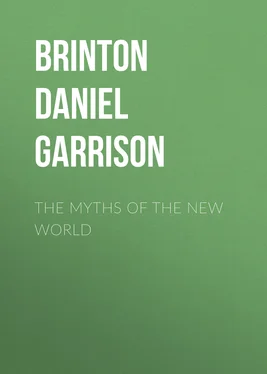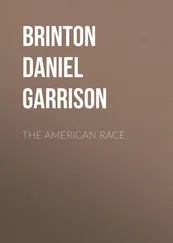Daniel Brinton - The Myths of the New World
Здесь есть возможность читать онлайн «Daniel Brinton - The Myths of the New World» — ознакомительный отрывок электронной книги совершенно бесплатно, а после прочтения отрывка купить полную версию. В некоторых случаях можно слушать аудио, скачать через торрент в формате fb2 и присутствует краткое содержание. Жанр: foreign_prose, История, Старинная литература, Мифы. Легенды. Эпос, foreign_edu, foreign_antique, на английском языке. Описание произведения, (предисловие) а так же отзывы посетителей доступны на портале библиотеки ЛибКат.
- Название:The Myths of the New World
- Автор:
- Жанр:
- Год:неизвестен
- ISBN:нет данных
- Рейтинг книги:5 / 5. Голосов: 1
-
Избранное:Добавить в избранное
- Отзывы:
-
Ваша оценка:
- 100
- 1
- 2
- 3
- 4
- 5
The Myths of the New World: краткое содержание, описание и аннотация
Предлагаем к чтению аннотацию, описание, краткое содержание или предисловие (зависит от того, что написал сам автор книги «The Myths of the New World»). Если вы не нашли необходимую информацию о книге — напишите в комментариях, мы постараемся отыскать её.
The Myths of the New World — читать онлайн ознакомительный отрывок
Ниже представлен текст книги, разбитый по страницам. Система сохранения места последней прочитанной страницы, позволяет с удобством читать онлайн бесплатно книгу «The Myths of the New World», без необходимости каждый раз заново искать на чём Вы остановились. Поставьте закладку, и сможете в любой момент перейти на страницу, на которой закончили чтение.
Интервал:
Закладка:
Armed with these analogies, we turn to the primitive tongues of America, and find them there as distinct as in the Old World. In Dakota niya is literally breath, figuratively life; in Netela piuts is life, breath, and soul; silla , in Eskimo, means air, it means wind, but it is also the word that conveys the highest idea of the world as a whole, and the reasoning faculty. The supreme existence they call Sillam Innua , Owner of the Air, or of the All; or Sillam Nelega , Lord of the Air or Wind. In the Yakama tongue of Oregon wkrisha signifies there is wind, wkrishwit , life; with the Aztecs, ehecatl expressed both air, life, and the soul, and personified in their myths it was said to have been born of the breath of Tezcatlipoca, their highest divinity, who himself is often called Yoalliehecatl, the Wind of Night. 42 42 My authorities are Riggs, Dict. of the Dakota , Boscana, Account of New California , Richardson’s and Egede’s Eskimo Vocabularies, Pandosy, Gram. and Dict. of the Yakama (Shea’s Lib. of Am. Linguistics), and the Abbé Brasseur for the Aztec.
The descent is, indeed, almost imperceptible which leads to the personification of the wind as God, which merges this manifestation of life and power in one with its unseen, unknown cause. Thus it was a worthy epithet which the Creeks applied to their supreme invisible ruler, when they addressed him as Esaugetuh Emissee, Master of Breath, and doubtless it was at first but a title of equivalent purport which the Cherokees, their neighbors, were wont to employ, Oonawleh unggi, Eldest of Winds, but rapidly leading to a complete identification of the divine with the natural phenomena of meteorology. This seems to have taken place in the same group of nations, for the original Choctaw word for Deity was Hushtoli, the Storm Wind. 43 43 These terms are found in Gallatin’s vocabularies. The last mentioned is not, as Adair thought, derived from issto ulla or ishto hoollo , great man, for in Choctaw the adjective cannot precede the noun it qualifies. Its true sense is visible in the analogous Creek words ishtali , the storm wind, and hustolah , the windy season.
The idea, indeed, was constantly being lost in the symbol. In the legends of the Quiches, the mysterious creative power is Hurakan, a name of no signification in their language, one which their remote ancestors brought with them from the Antilles, which finds its meaning in the ancient tongue of Haiti, and which, under the forms of hurricane , ouragan , orkan , was adopted into European marine languages as the native name of the terrible tornado of the Caribbean Sea. 44 44 Webster derives hurricane from the Latin furio . But Oviedo tells us in his description of Hispaniola that “Hurakan, in lingua di questa isola vuole dire propriamente fortuna tempestuosa molto eccessiva, perche en effetto non è altro que un grandissimo vento è pioggia insieme.” Historia dell’ Indie , lib. vi. cap. iii. It is a coincidence—perhaps something more—that in the Quichua language huracan , third person singular present indicative of the verbal noun huraca , means “a stream of water falls perpendicularly.” (Markham, Quichua Dictionary , p. 132.)
Mixcohuatl, the Cloud Serpent, chief divinity of several tribes in ancient Mexico, is to this day the correct term in their language for the tropical whirlwind, and the natives of Panama worshipped the same phenomenon under the name Tuyra. 45 45 Oviedo, Rel. de la Prov. de Cueba , p. 141, ed. Ternaux-Compans.
To kiss the air was in Peru the commonest and simplest sign of adoration to the collective divinities. 46 46 Garcia, Origen de los Indios , lib. iv. cap. xxii.
Many writers on mythology have commented on the prominence so frequently given to the winds. None have traced it to its true source. The facts of meteorology have been thought all sufficient for a solution. As if man ever did or ever could draw the idea of God from nature! In the identity of wind with breath, of breath with life, of life with soul, of soul with God, lies the far deeper and far truer reason, whose insensible development I have here traced, in outline indeed, but confirmed by the evidence of language itself.
Let none of these expressions, however, be construed to prove the distinct recognition of One Supreme Being. Of monotheism either as displayed in the one personal definite God of the Semitic races, or in the dim pantheistic sense of the Brahmins, there was not a single instance on the American continent. The missionaries found no word in any of their languages fit to interpret Deus , God. How could they expect it? The associations we attach to that name are the accumulated fruits of nigh two thousand years of Christianity. The phrases Good Spirit, Great Spirit, and similar ones, have occasioned endless discrepancies in the minds of travellers. In most instances they are entirely of modern origin, coined at the suggestion of missionaries, applied to the white man’s God. Very rarely do they bring any conception of personality to the native mind, very rarely do they signify any object of worship, perhaps never did in the olden times. The Jesuit Relations state positively that there was no one immaterial god recognized by the Algonkin tribes, and that the title, the Great Manito, was introduced first by themselves in its personal sense. 47 47 See the Rel. de la Nouv. France pour l’An 1637 , p. 49.
The supreme Iroquois Deity Neo or Hawaneu, triumphantly adduced by many writers to show the monotheism underlying the native creeds, and upon whose name Mr. Schoolcraft has built some philological reveries, turns out on closer scrutiny to be the result of Christian instruction, and the words themselves to be but corruptions of the French Dieu and le bon Dieu ! 48 48 Mr. Morgan, in his excellent work, The League of the Iroquois , has been led astray by an ignorance of the etymology of these terms. For Schoolcraft’s views see his Oneota , p. 147. The matter is ably discussed in the Etudes Philologiques sur Quelques Langues Sauvages de l’Amérique , p. 14: Montreal, 1866; but comp. Shea, Dict. Français-Onontagué , preface.
Innumerable mysterious forces are in activity around the child of nature; he feels within him something that tells him they are not of his kind, and yet not altogether different from him; he sums them up in one word drawn from sensuous experience. Does he wish to express still more forcibly this sentiment, he doubles the word, or prefixes an adjective, or adds an affix, as the genius of his language may dictate. But it still remains to him but an unapplied abstraction, a mere category of thought, a frame for the All. It is never the object of veneration or sacrifice, no myth brings it down to his comprehension, it is not installed in his temples. Man cannot escape the belief that behind all form is one essence; but the moment he would seize and define it, it eludes his grasp, and by a sorcery more sadly ludicrous than that which blinded Titania, he worships not the Infinite he thinks but a base idol of his own making. As in the Zend Avesta behind the eternal struggle of Ormuzd and Ahriman looms up the undisturbed and infinite Zeruana Akerana, as in the pages of the Greek poets we here and there catch glimpses of a Zeus who is not he throned on Olympus, nor he who takes part in the wrangles of the gods, but stands far off and alone, one yet all, “who was, who is, who will be,” so the belief in an Unseen Spirit, who asks neither supplication nor sacrifice, who, as the natives of Texas told Joutel in 1684, “does not concern himself about things here below,” 49 49 “Qui ne prend aucun soin des choses icy bas.” Jour. Hist. d’un Voyage de l’Amérique , p. 225: Paris, 1713.
who has no name to call him by, and is never a figure in mythology, was doubtless occasionally present to their minds. It was present not more but far less distinctly and often not at all in the more savage tribes, and no assertion can be more contrary to the laws of religious progress than that which pretends that a purer and more monotheistic religion exists among nations devoid of mythology. There are only two instances on the American continent where the worship of an immaterial God was definitely instituted, and these as the highest conquests of American natural religions deserve especial mention.
Интервал:
Закладка:
Похожие книги на «The Myths of the New World»
Представляем Вашему вниманию похожие книги на «The Myths of the New World» списком для выбора. Мы отобрали схожую по названию и смыслу литературу в надежде предоставить читателям больше вариантов отыскать новые, интересные, ещё непрочитанные произведения.
Обсуждение, отзывы о книге «The Myths of the New World» и просто собственные мнения читателей. Оставьте ваши комментарии, напишите, что Вы думаете о произведении, его смысле или главных героях. Укажите что конкретно понравилось, а что нет, и почему Вы так считаете.












